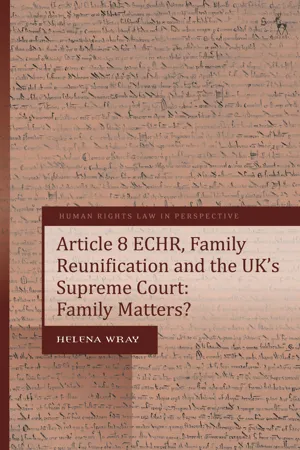
eBook - ePub
Article 8 ECHR, Family Reunification and the UK’s Supreme Court
Family Matters?
- 320 pages
- English
- ePUB (mobile friendly)
- Available on iOS & Android
eBook - ePub
About this book
How do courts reconcile protecting family life with immigration control in human rights cases? This book addresses that question through an analysis of 11 UK Supreme Court decisions on immigration and family life, mostly focusing on Article 8 ECHR, the right to respect for family life, and starting with Huang v SSHD in 2007. The analysis is set against a national context that includes the Human Rights Act 1998 and regular controversies over immigration.
The book explains how the European Court of Human Rights jurisprudence has developed in recent years, but, particularly in the absence of children, it often still awards little weight to claims by citizens and residents to be joined by family when immigration status is an issue. This reflects governments' resistance to encroachment on their control over borders. The Supreme Court decisions show that, despite powers conferred by the Human Rights Act, a more nuanced position in domestic law was difficult to articulate and sustain. The book explores the way in which these problems were reflected in the changing language, argumentation, and structure of judgments. These problems revealed judges to be strategic actors drawing on personal and institutional values and responding to the shifting political context.
A more generous reading of Article 8 would be legally coherent but needs wider societal support to be realisable. The book ends with a discussion of how, if such support were present, the jurisprudence could give more weight to the needs of families. It is vital reading for anyone interested in families and immigration, and in the problems and potential of human rights adjudication.
The book explains how the European Court of Human Rights jurisprudence has developed in recent years, but, particularly in the absence of children, it often still awards little weight to claims by citizens and residents to be joined by family when immigration status is an issue. This reflects governments' resistance to encroachment on their control over borders. The Supreme Court decisions show that, despite powers conferred by the Human Rights Act, a more nuanced position in domestic law was difficult to articulate and sustain. The book explores the way in which these problems were reflected in the changing language, argumentation, and structure of judgments. These problems revealed judges to be strategic actors drawing on personal and institutional values and responding to the shifting political context.
A more generous reading of Article 8 would be legally coherent but needs wider societal support to be realisable. The book ends with a discussion of how, if such support were present, the jurisprudence could give more weight to the needs of families. It is vital reading for anyone interested in families and immigration, and in the problems and potential of human rights adjudication.
Frequently asked questions
Yes, you can cancel anytime from the Subscription tab in your account settings on the Perlego website. Your subscription will stay active until the end of your current billing period. Learn how to cancel your subscription.
No, books cannot be downloaded as external files, such as PDFs, for use outside of Perlego. However, you can download books within the Perlego app for offline reading on mobile or tablet. Learn more here.
Perlego offers two plans: Essential and Complete
- Essential is ideal for learners and professionals who enjoy exploring a wide range of subjects. Access the Essential Library with 800,000+ trusted titles and best-sellers across business, personal growth, and the humanities. Includes unlimited reading time and Standard Read Aloud voice.
- Complete: Perfect for advanced learners and researchers needing full, unrestricted access. Unlock 1.4M+ books across hundreds of subjects, including academic and specialized titles. The Complete Plan also includes advanced features like Premium Read Aloud and Research Assistant.
We are an online textbook subscription service, where you can get access to an entire online library for less than the price of a single book per month. With over 1 million books across 1000+ topics, we’ve got you covered! Learn more here.
Look out for the read-aloud symbol on your next book to see if you can listen to it. The read-aloud tool reads text aloud for you, highlighting the text as it is being read. You can pause it, speed it up and slow it down. Learn more here.
Yes! You can use the Perlego app on both iOS or Android devices to read anytime, anywhere — even offline. Perfect for commutes or when you’re on the go.
Please note we cannot support devices running on iOS 13 and Android 7 or earlier. Learn more about using the app.
Please note we cannot support devices running on iOS 13 and Android 7 or earlier. Learn more about using the app.
Yes, you can access Article 8 ECHR, Family Reunification and the UK’s Supreme Court by Helena Wray in PDF and/or ePUB format, as well as other popular books in Droit & Droit de la famille. We have over one million books available in our catalogue for you to explore.
Information
Table of contents
- Cover
- Dedication
- Title Page
- Acknowledgements
- Contents
- Table of Cases
- Table of Legislation
- 1. Introduction: Family Reunification, Human Rights and Judges
- 2. Introduction to the UK’s Constitutional, Court and Immigration System
- 3. The European Court of Human Rights: Strait is the Gate
- 4. Huang: Breathing Life into Article 8
- 5. ‘Good News from on High’: The First Post-Huang Phase
- 6. Still Family First: The Second Post-Huang Phase
- 7. The Supreme Court Rolls Back: The Third Post-Huang Phase
- 8. A Better Article 8 is Possible
- 9. Concluding Remarks
- Appendix: Content Analysis Methodology
- Bibliography
- Index
- Copyright Page